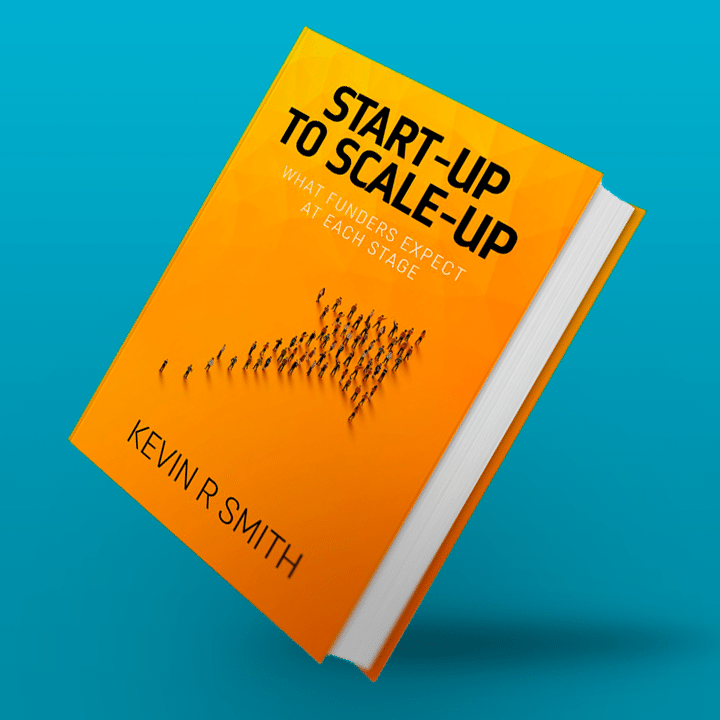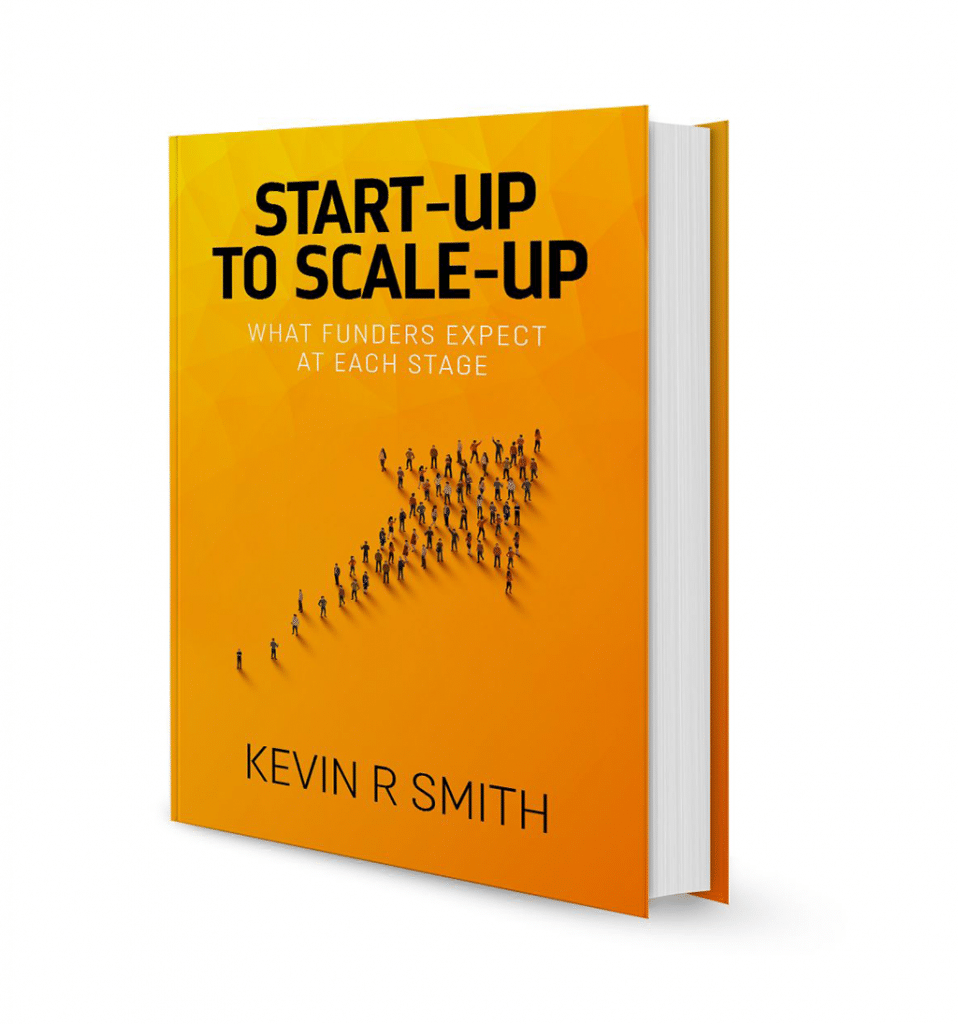Startup to Scale-up – What funders expect at each stage
An interview with Kevin R Smith on his New Book
We got a chance to interview Kevin R Smith on his new book for founders at The Business Show 2021
What prompted you to write the book?
I do a lot of published writing and have done it for many, many years. And it’s all about early-stage businesses and helping them to grow and everything from how to set up a business all the way through to scaling and what they need to do to get investment ready and the difference between different types of investors.
And I had quite a lot of people say to me, why don’t you put it all in one place? So I thought. Okay. So I wrote the book and it’s meant to be that entire journey. The idea of it is you can either read it from cover-to-cover or you can read whichever bit is applicable to you at the time and come back in a month or six months time and pick it up when you are at that next stage.
Like a reference book?
Yeah. It’s meant to be written for intelligent people that just don’t happen to know this particular topic. So it’s not over academic, it’s not over jargony, it’s easy to read and understand and hopefully answers lots of questions.
Brilliant. So…
How is this book different from other startups books?
I think many books tend to take one of two angles. One is a much more academic, business course type book and the other tends to be, overly jargonised and I guess actually there’s a third, which is just focused on particular areas.
What I tried to do is take that whole journey. It’s 25 chapters, nice sort of bite-sized. And as I say, it’s really just meant to be an easy to read and easy to understand book that helps people on that journey.
That’s great, …an accessible book. On to the third question…
In general, what are the common pitfalls of startups?
I would say that there’s well… many. So many businesses or startups don’t quite understand that everything typically will take twice as long and cost twice as much as they might imagine, because cash is often tied to it. They try to do everything themselves and no matter how clever you are, none of us actually know everything, or even if you do, you don’t have the time to do everything.
So I think it’s important that you get the right help at the right stages. And whether that’s getting a mentor or going through an accelerator, or whether that’s getting the right help for specific projects. And as you grow a bit more, it’s definitely about getting the right advisory boards and people around you to help you with that strategy and understanding the areas of your business that you don’t necessarily understand.
Sound advice for a support system. So, this time more specifically…
What are the common growth problems that are faced by startups? ...scaling wise
When businesses are looking to scale, they typically need some sort of finance. If it’s an early stage, early-stage business. It’s difficult to get bank debt because traditional banks look for three years worth of profitable trading, some of the newer banks will go down to 18 months, but nevertheless, you can only borrow really quite small amounts. If you’re looking to scale, you need larger amounts. So typically that means raising equity in one form or another.
Then you need to understand lots of different things, how to value your business, to make sure that you’re selling the right amount of equity for the right amount of money. And that’s guesswork frankly for an early-stage business, but it has to be informed guesswork, and we can help with that.
But again, if you don’t know, it’s not easy, so that’s one aspect. It also depends what type of business it is and what stage you’re at as to how much you want to raise. And then, where is the best place to raise that from? All of those areas potentially make it quite difficult and when combined, most businesses think it is a quicker and easier process than it actually is.
So you should expect, even when you’re investment ready, for it to take maybe six months. Whereas many people come to me and say, we need to raise equity and we need it in two months time. And that’s such a common conversation.
Okay. Interesting. So it’s just about being a little more realistic and practical?
It is, but it’s a case of understanding what is realistic, not what you think is realistic, but what the market thinks is realistic, and pitch decks is another very common conversation that we have. So we’ve worked with businesses, helping them to create the best pitch deck. So often the pitch decks that we see first are just never going to happen because they’re typically much too wordy, much too long.
And, statistically, a VC or an investor would spend three seconds a slide looking at the pitch deck. It needs to stand out. It needs to be interesting. It needs to have a visual impact. You need to be able to take in the information at a glance, but you also then need to have some information. But all the pitch deck is trying to do is to get them interested enough, to want to look at more detail in the next stage.
And that’s something that is a big problem.
That’s great that you’ve segwayed onto and partly answered the next question, which was actually about…
How important is visual design and storytelling, with regards to pitch decks in comparison to the actual content?
Content of course is important but it is about storytelling. There is, in the book, a whole chapter that is about pitch decks and writing a pitch deck and what needs to go into it, but it is about storytelling. And you have to tell your story and it has to be partly about you because as an early-stage business, the investor is buying you, it’s not just the business, they’re backing you as to whether you can deliver that business.
And the pitch deck itself has to have a good visual impact so that it captures their imagination. It really makes them want to turn the next page.
Yeah, like a trailer for a movie?
Exactly the point. If you think of it as a trailer for an upcoming blockbuster movie, it makes you want to go and see the movie, not just to sort of get bored and go through it.
And you know…
You need to excite people right?
Absolutely. Absolutely.
Fabulous. Okay. So the last question, following on from the design and visual aesthetics… which is a broader question around branding…
How important is branding, for startups from your perspective?
I think branding is the whole visual impact of the broader brand.
So think of it in terms of all of the things that you do is important. The name of what it looks like, everything. So if you look at my own business, Boom & Partners we are a, I guess you could call it a financial consultancy or a business consultancy, you know, potentially a boring type of business, but we didn’t want to come across as old fashioned and boring.
We wanted to come across as being approachable and friendly, but we’re not a marketing or an ad agency. So you can’t be too hip. You have to be a bit serious, but also a bit approachable. And that’s what we’ve tried to achieve in our own website and branding and what we are actually very often I’m told has worked extremely well.
And only yesterday here at the business show, we’d actually put things away and a lady stopped and saw the name of the company, Boom. And she said, wow, that must be a fantastic company. And that for me is going to stick in my mind.
And not just because of the name of the company, but then the branding aesthetic as a whole, like the cover of the book is orange, which, it’s my book nevertheless, it fits in with the orange of the business. So you’ve got that sort of tie in.
The logo of our business is meant to be sort of confident and happy, but also a serious angle to it. And I think what’s important, whatever you’re doing, you need to try and get across your personality in your business, but also look at it, what are your clients wanting to buy? So they’re the points I would go with, but whatever you’re doing, it needs to be in everything that you’re doing so that there is that tie in.
Consistency?
Yeah.
That’s great. Thank you very much for your time.

So there you have it, folks. A quick breakdown of Kevin’s book, Startup to Scaleup – What funders expect at each stage. Go and grab your copy now!
He also touched on the importance of branding for startups and that it is much broader than visual aesthetics.
To expand branding can be the purpose your business exists, the values and beliefs you hold as an organisation and how that will inform the company culture and who you will hire. The importance of placing your customers at the heart of your brand and how you serve the distinctly different from your competition.
Branding is broader than consistently applied visual aesthetic, but it’s the visual impact that hits the right emotional cords and gets the audience interested in the first place.
If you need help with strategically branding your startup, do get in touch.
An interview with James Church on his book for founders seeking investment We...
If a guest asked for toast, would you butter a piece of bread...
A new 3 part interview with James Church on his book for founders...




